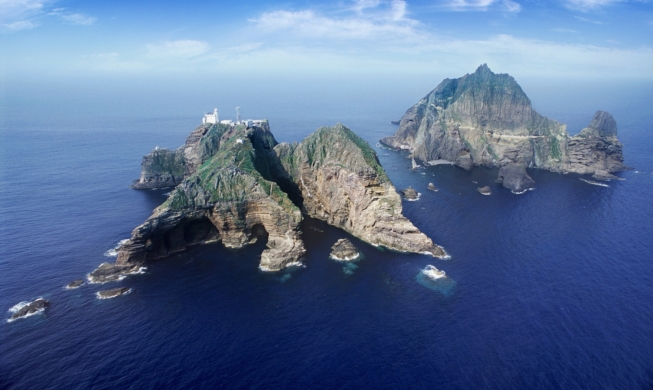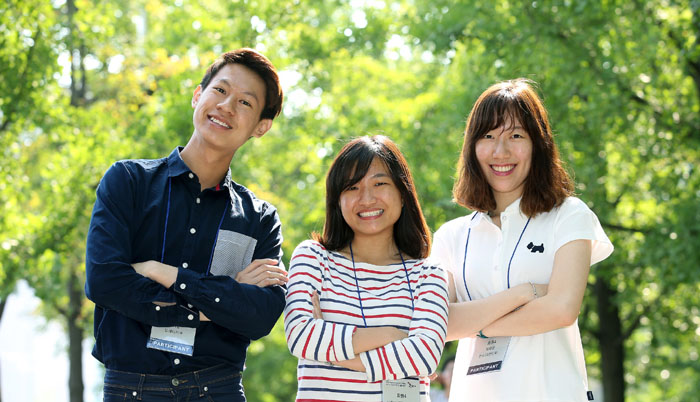
One of the fourth-place prizes at the 2015 ‘Exploring Korean Humanities Together’ competition, held on July 4 in Jecheon, Chungcheongbuk-do Province (North Chungcheong Province), goes to the ‘Hwawon 4’ team. The team of college students includes (from left) Kevin Wong Wai Hoong and Liew Jeen Vern from Malaysia and Chae Hye-jeong from Korea.
Two teams, “Hwawon” and “DoDream,” out of the 13 teams competing, won a fourth-place prize in the 2015 “Exploring Korean Humanities Together” competition on July 4. The competition provided a platform where global youth from around the world could come together to give a series of presentations on historic Korean figures.
The "Hwawon" team was comprised of four college students: Kevin Wong Wai Hoong and Liew Jeen Vern, both Malaysian students at Seoul National University and Yonsei University, respectively, and Cheon Hye-jeong and Kim Yee-jin, both Korean students at Yonsei University. The students focused on one of the leading painters from Joseon times, Kim Hong-do (1745-1806) (김홍도, 金弘道), who went by the pen name Danwon (단원, 檀園).
As part of their research over the span of several months, the team visited the National Museum of Korea and an exhibition at the Dongdaemun Design Plaza to see firsthand some of Danwon’s most famous paintings.
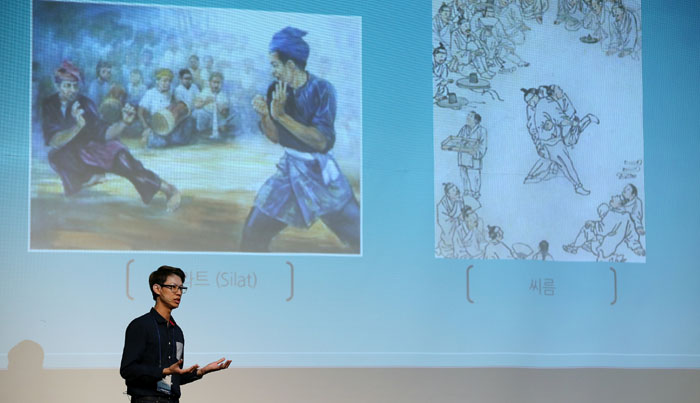
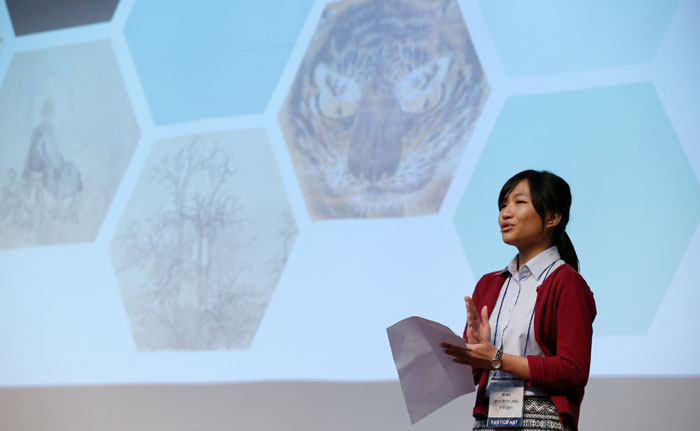
Malaysian members of the ‘Hwawon’ team, the recipient of a fourth-place prize, give a presentation on painter Kim Hong-do (1745-1806).
In their presentation, “The World as Seen by Kim Hong-do, and Kim Hong-do as Seen by Us,” the students talked about everyday life during Joseon times, based on Danwon’s masterpieces. They also analyzed the painter’s signature brush stroke in some of his major paintings, such as "Sangbak" (상박, 相撲) and “Danwondo” (단원도, 檀園圖).
The most noteworthy part of their presentation compared Danwon and a Malaysian painter Mohd Hoessein Enas (1924-1947), an artist who produced similar artwork. For example, the Malaysian artist painted people practicing the traditional Malaysian martial art silat, just as Danwon painted people doing traditional Korean wrestling, ssireum, in his work “Sangbak.”
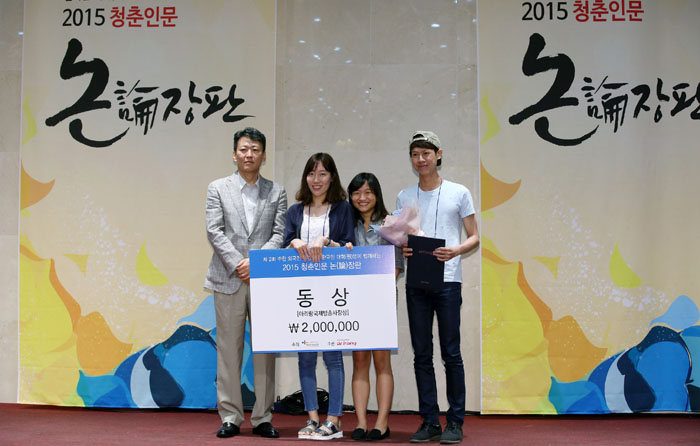
The ‘Hwawon’ team receives KRW 2 million, tying for fourth place in the competition.
“Looking deeper into Danwon's life, we realized that people don't really think about what he did, his deeds or how the legacy left by him has affected the generations that followed,” said the team. “Not only non-Koreans, but Korean people, too, must remember and appreciate his legacy.”
Another fourth-place prize went to the “DoDream” team, which explored the life of Yi Won-rok (1904-1944) (이원록, 李源祿), better known by his penname Yi Yuksa (이육사, 李陸史), an independence activist and poet during colonial times. The team's four members were Xu Xiaochun from China, Namuungerel Ganbaatar from Mongolia, Yoo Ji-woo from Korea, all students at Sookmyung Women’s University, and, lastly, Sambuu Bulgantmir, a Mongolian student at Kwangwoon University.
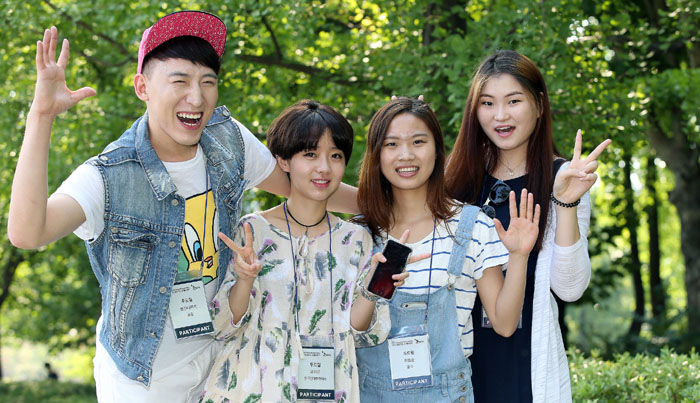
The ‘DoDream’ team tied for fourth place along with the ‘Hwawon4’ team. The team consists of Sambuu Bulgantmir (left) and Namuungerel Ganbaatar (right) from Mongolia, Yoo Ji-woo (second from left) from Korea, and Xu Xiaochun (second from right) from China. They spoke about independence activist and poet Yi Yuksa (1904-1944).
The team put on a small skit that shed light on the life of Yi Yuksa as an independence activist who risked his life to fight for the people. They also spoke about his life as a poet who produced great works of art, reciting some of his major poems, including “Green Grape” and “The Wilderness. ”
A more interesting part of the show was when they compared Yi with independence fighters from China and Mongolia. The Chinese student introduced Lu Xun (1881-1936) (魯迅), a Chinese activist and novelist. “Both figures have a lot in common. They rendered distinguished service for national independence. Lu Xun produced great literary works, such as 'Hometown' and 'Wild Grass,' just as Yi did,” said Xu Xiaochun.
Sambuu Bulgantmir, one of the Mongolian students, cited Damdin Suhbator (1893-1923) as one of the most important figures in his homeland’s struggle for independence.
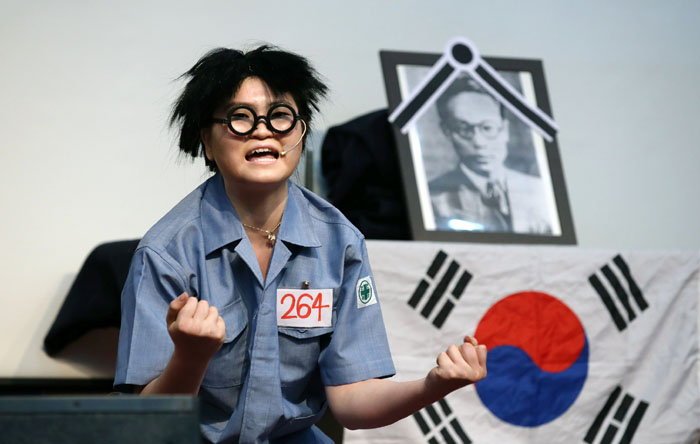
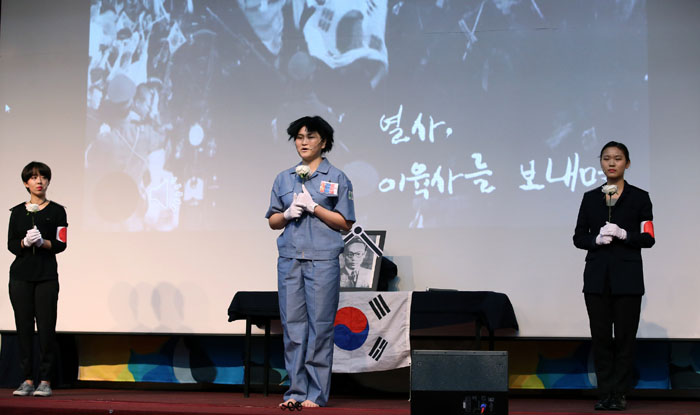
During the competition, the ‘DoDream’ team puts on a play focusing on the life and deeds of independence activist and poet Yi Yuksa.
The cross-cultural team of three nationalities, of different cultures and histories, concluded by saying that, “Looking back on the life of Yi Yuk-sa, you will think deeply about what the spirit of patriotism really means. His story will cause you to reflect upon yourself.”
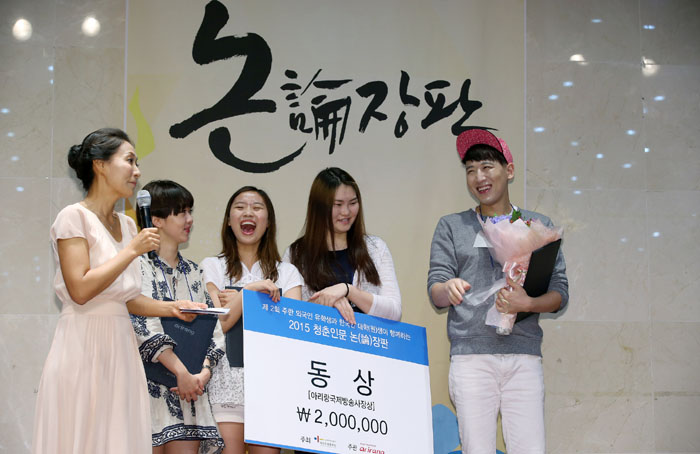
Members of the ‘DoDream’ team, from Korea, China and Mongolia, rejoice as they win a fourth-place prize in the competition.
By Sohn JiAe
Photos: Jeon Han
Korea.net Staff Writers
jiae5853@korea.kr
Most popular
- Grammy-winning producer calls Suga of BTS 'amazing artist'
- 'Universal love, family' themes fuel success of 'King of Kings': director
- Council sets minimum hourly wage in 2026 at KRW 10,320
- Expansion of foreign app system raises tourist convenience
- Nat'l population diversity rose nearly 8% from 2018-22: study
